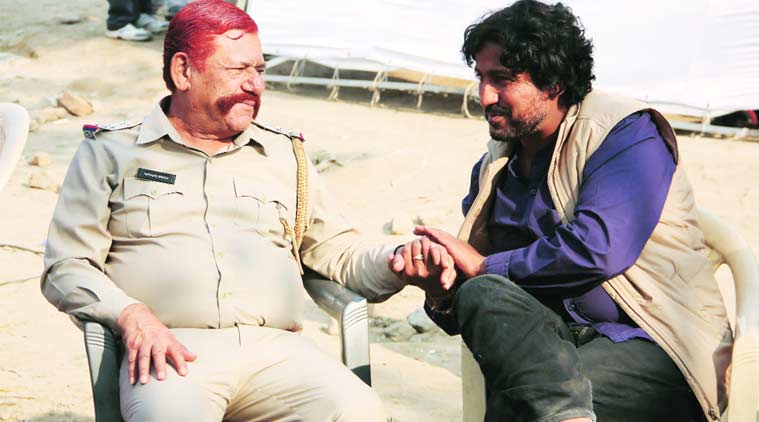Click here to follow Screen Digital on YouTube and stay updated with the latest from the world of cinema.
Tell Tail Signs
Journalist-turned filmmaker Vinod Kapri on his black comedy Miss Tanakpur Haazir Ho
 (Above) Om Puri with director Vinod Kapri; a still from Can’t Take This Shit Anymore
(Above) Om Puri with director Vinod Kapri; a still from Can’t Take This Shit Anymore
In February 2012, Vinod Kapri read in a newspaper that a film on Paan Singh Tomar would release in a month. Nine years ago, as a reporter he had visited Bhind-Morena district in Madhya Pradesh, notorious for dacoits. There, he stumbled upon the fascinating story of Tomar, a steeplechase runner-turned dacoit.
Kapri found the idea perfect for a feature film, but as an editor, working 24×7, for a Hindi news channel, it was left on the backburner. “It’s at that moment, that I seriously started thinking of myself as a filmmaker. It gave me the confidence that my ideas have some power and they could be turned into feature films too,” says the 43-year-old.
His debut feature film Miss Tanakpur Haazir Ho (MTHH) releases in theatres across India on June 26. MTHH also owes its story to Kapri’s 20-year-old journalistic experience. It’s inspired by one particular incident from 2012, in a village in Sri Madhopur tehsil in Rajasthan, where a man was sentenced to five years of jail for raping a buffalo. The film is a socio-political satire with a bizarre plot.
“It was a fabricated case. I met all the people — the accused, the lawyers, the police, the vet, and the villagers. I found it funny and also very serious. It had the perfect ingredients for a black comedy. The film highlights the numerous false cases in our country, the superstitions in north India, the ugly face of khap panchayat and the way the law and police functions,” says Kapri.
MTHH has a solid ensemble of actors such as Sanjay Mishra, Annu Kapoor, Om Puri, Rahul Bagga and Ravi Kishan. The film’s trailer earned praise on social media including from personalities such as Amitabh Bachchan and Raju Hirani. Kapri considers the latter’s interaction another turning point in his filmmaking career. “Four years ago, he called to tell me that he liked a documentary I had made on Anna Hazare. He encouraged me to take up
filmmaking.”
Fittingly, Kapri showed the first cut of MTHH to Hirani. “He suggested a few edits, including a song that was close to my heart, that we have done away with now,” he says. Kapri has been making films for over 15 years now.
As the producer of a new TV show in 2000, Kapri started making documentaries on unusual subjects and people, including films on gay and lesbian relationships, on aghori sadhus, as well as on the people who visit Varanasi to
attain moksha.Kapri’s first independent documentary, outside his TV journalism career, Can’t Take This Shit Anymore, won the National Award this year for the best film on social issues. The film highlights the issue of open defecation of women in villages in India, and revolves around six women who revolt and leave their husbands.
Kapri’s first independent documentary, outside his TV journalism career, Can’t Take This Shit Anymore, won the National Award this year for the best film on social issues. The film highlights the issue of open defecation of women in villages in India, and revolves around six women who revolt and leave their husbands.
Five socio – political satires
Jaane Bhi Do Yaaron (1983): Two unassuming photographers start a new studio and stumble upon the shady side of real estate, unearthing murder and corruption.
Welcome to Sajjanpur (2008): A young, educated man takes up the job of writing letters for the illiterate people of his village, Sajjanpur.
Phas Gaya Re Obama (2010): Set against the backdrop of global recession, the story sees desperate gangsters kidnapping a near-bankrupt American.
Dekh Tamasha Dekh (2014): Both the Hindu and Muslim factions lay claim to the body of a man who is crushed to death after a politician’s hoarding falls on him.
Dharam Sankat Mein (2015): At the age of 55, a Hindu man discovers that he was born a Muslim.


- 01
- 02
- 03
- 04
- 05
































